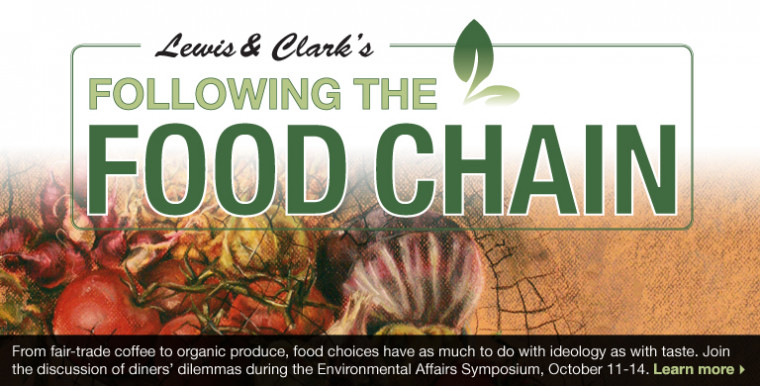Environmental symposium inspires constructive controversy about food system
Open gallery

Discussion about the modern food system often devolves into binaries like organic versus conventional or carnivore versus omnivore.
The student organizers of the 2010 Environmental Affairs Symposium want to put an end to that reductive way of thinking. “Following the Food Chain,” held October 11-14, will encourage exploration of the broad range of issues influencing food choices and the ways in which eating can operate as a form of environmentalism.
Highlights of the symposium
- An outdoor food fair will draw local vendors, restaurants, businesses, breweries, advocacy groups, and other food organizations that are seeking to change the way food is viewed, consumed and produced. October 11 at 3 p.m.
- A panel discussion titled “The Food Eater’s Dilemma” will explore the challenges of making environmentally and socially justifiable food choices. October 12 at 3 p.m.
- “The Life of a Latte” will put coffee into a broader social and ecological context, exploring how supply chains impact producers, distributors, and consumers. October 12 at 7 p.m.
- The keynote will feature dialogue and debate on the topic of organics for the masses. Speakers include Mike Gilland, co-founder of Wild Oats Markets, and Julie Guthman, who teaches and writes about the politics of food, and who recently published “How Michael Pollan, et al. Made Me Want to Eat Cheetos.” October 13 at 7 p.m.
- All events are free and open to the public. Visit the symposium website for the complete schedule and venue information. Use #lcfoodsymp to join the conversation on Twitter.
The politics of food labeling
One of the key concerns of the symposium is the challenge of labeling foods. Though labels provide details about ingredients, nutrition, and certifications, their complex messages and meanings may disillusion consumers. A panel featuring Dan Jaffee, author of “Brewing Justice,” will explore this significance of labels like “organic” and the impact they have on the food system.
In the following excerpt from the Environmental Studies Program blog, Tara Brown ’12 writes about the food labeling debate and her hope that the symposium can push the conversation forward.
As an ENVS major focusing on food systems and social justice, connecting the food on my plate to broader processes of production and distribution has become a frequent dinner conversation in my life. One conversation in particular stands out. My companions included a few passionate vegans who were able to list off from memory dozens of unpronounceable ingredients containing animal products and a student involved in the Portland-based non-GMO project who was able to perform a similar trick with products including genetically modified ingredients. A friend of mine and I rounded out the discussion, attempting holism but clearly most passionate about issues surrounding farm-worker justice and international agricultural imperialism.
This conversation really made me appreciate Real Food Challenge, which is a national student organization committed to leveraging their power as students to demand that the four billion dollars colleges in the United States spend on food each year goes toward food that nourishes consumers, producers, and the planet. I recently returned from a national organizer training with Real Food Challenge that pushed me to look at food issues more broadly than I otherwise would.
Purists won’t be pleased by RFC. “Real Food” is considered fair, local, humane, and ecologically sound, but the standards for many of the categories are not as stringent as single-issue foodies might prefer. Legitimate criticisms have been leveled at the organic, fair trade, and humane certifications that the Real Food Calculator is based on. As a member of the 2010 ENVS Symposium Planning Committee, I’m trying to ensure that each of these labels is considered with a critical eye. …
I would love to see a food system where all connections between producers and consumers were direct and fair, as well as a food system based on connections to the land that could be sustained for centuries to come. This is what I’m working for, but I recognize that it can’t be achieved overnight.
The philosophy of Real Food Challenge is about not letting our desire to make the food system perfect get in the way of our ability to make it better. The role of academia and critical thinking in all of this is about not ignoring the devilish details (how much more do fair-trade producers make, exactly?) in the name of progress. I think that both approaches are irrelevant without the other, so I’d like to figure out a way to make activists and academics more directly accountable to one another.
With respect to our upcoming ENVS Symposium, this will mean pushing speakers who have dedicated their lives toward promoting change to reflect on how they could be doing better. It will also mean pushing speakers who specialize in deconstructing imperfect solutions to be as specific about their visions for change as they are about the flaws in the action plans of others. It will mean challenging all involved to recognize that there are no easy answers, but that it is this very fact that makes responding both intellectually and actively to the challenges in our modern food system so important.
Read the full post at the Environmental Studies Program blog.
More Newsroom Stories
Public Relations is located in McAfee on the Undergraduate Campus.
MSC: 19
email public@lclark.edu
voice 503-768-7970
Public Relations
Lewis & Clark
615 S. Palatine Hill Road MSC 19
Portland OR 97219

